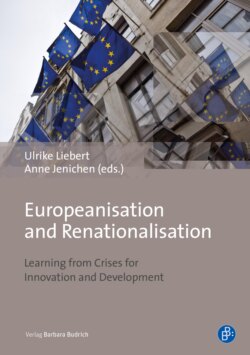Читать книгу Europeanisation and Renationalisation - Группа авторов - Страница 44
На сайте Литреса книга снята с продажи.
5. [71] Political parties and civil society in the wake of the crisis
ОглавлениеThe economic crisis brought about a gradual entanglement of non-partisan protest movements with parties of the opposition, as party militants were able to imbue the protests with an anti-capitalist and anti-European rhetoric. A typical example was the long-term strike of workers in the private, steel producing factory “Halyvourgia” in Western Athens. The strike, which lasted for nine months in 2011-2012, started when workers refused to accept salary cuts. However, the largest faction of the factory-based union wanted to reach a compromise, while a smaller but radicalised faction did not agree. The communistled smaller faction physically blocked the opening of the factory's gates and periodically occupied part of the national highway passing by the factory. Meanwhile, the neo-Nazi Golden Dawn party also sent in its own party cadres to show support and distribute food and other goods to striking workers. Eventually, the strike was called off in July 2012, after the courts had decided that the strike was illegal, most union members left the site of the strike, and the Riot Police forced the gates of the factory open.
A similar entanglement between civic society and political parties can be traced in the evolving mass rallies in Athens in 2010-2012. Research has shown that at least 31 consecutive protest events took place in the span of 24 months (Kousis 2015). Participation in the protest events was comparatively small in the early period of the crisis. However, it reached a peak at three points in time, namely in May 2011 (when the government put forward the so-called ‘medium-term fiscal strategy program 2013-2016’), in September – October 2011 (when the government was drafting an austerity budget for two consecutive years, 2013-2014) and in January 2012 (when the government passed additional austerity measures).
Moreover, these three peak moments of social protest, when masses of people flooded the streets of Athens, coincided with the apex of mobilisation of the parties opposing the government. At that point, civil society took a back seat in social protest. Participation in demonstrations, organised by party organisations, grew significantly. This pattern was probably owed to several reasons: first, after the spontaneous protest movements which sprang up in the wake of the first Memorandum, a certain fatigue overtook movement participants who were not card-carrying party members and realised that their reaction did not alter government policy. Second, earlier protesters may have changed their priorities, by focusing on personal strategies necessary for survival in a situation of declining income and dwindling welfare services. And [72] third, spontaneous social movements, such as the ‘indignant people’s movement’, could not last long, because they lacked resources, discipline and leadership.
Protest movements which initially gained a lot of publicity and momentum, rallying together citizens of variable political beliefs, such as the ‘Won't Pay’ movement, gradually lost steam, as opposition parties transformed specific protest events into larger anti-government and anti-EU mobilisations.
